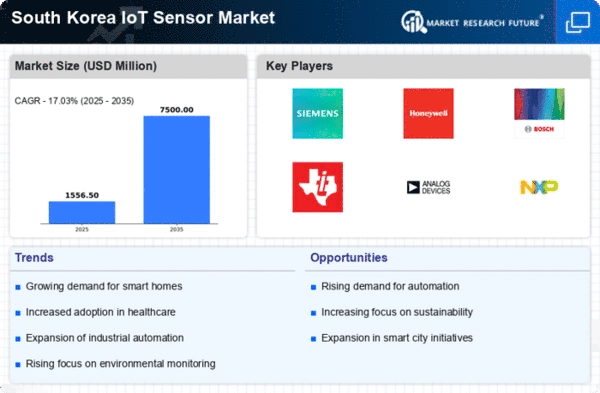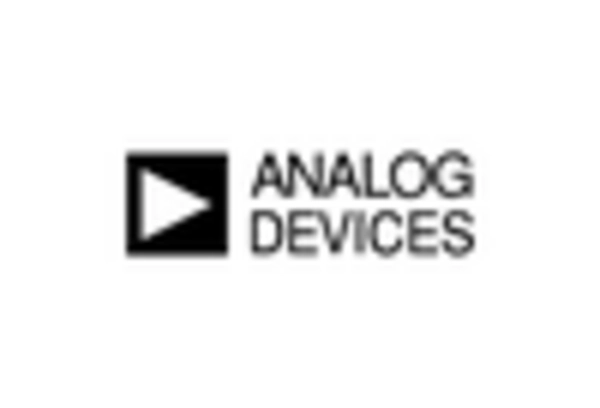Rising Demand for Automation
The increasing demand for automation across various sectors in South Korea is driving the growth of the iot sensor market. Industries such as manufacturing, logistics, and agriculture are increasingly adopting automated solutions to enhance efficiency and reduce operational costs. According to recent data, the automation market in South Korea is projected to grow at a CAGR of 10% from 2025 to 2030. This trend is likely to propel the adoption of IoT sensors, which are essential for real-time monitoring and control of automated systems. As businesses seek to optimize their processes, the integration of IoT sensors becomes crucial, thereby expanding the iot sensor market. Furthermore, the push for smart factories aligns with the national agenda for industrial innovation, further solidifying the role of IoT sensors in driving automation initiatives.
Advancements in Sensor Technology
Technological advancements in sensor technology are significantly influencing the iot sensor market in South Korea. Innovations such as miniaturization, enhanced connectivity, and improved data analytics capabilities are making IoT sensors more efficient and versatile. The introduction of next-generation sensors, which can operate in diverse environments and provide real-time data, is expected to expand their applications across various sectors. For instance, the development of low-power wide-area network (LPWAN) technology allows sensors to transmit data over long distances with minimal energy consumption. This advancement is likely to enhance the appeal of IoT sensors in industries such as agriculture and smart cities. As technology continues to evolve, the The market is expected to witness increased adoption., driven by the need for more sophisticated and reliable sensor solutions.
Government Initiatives and Support
Government initiatives aimed at promoting digital transformation in South Korea are significantly impacting the iot sensor market. The South Korean government has launched various programs to support the development and deployment of IoT technologies, including sensors. For instance, the 'Smart Korea' initiative aims to enhance connectivity and innovation across industries. This initiative is expected to allocate approximately $1 billion towards IoT infrastructure development over the next five years. Such government backing not only fosters a conducive environment for the growth of the iot sensor market but also encourages private sector investment. As a result, the collaboration between public and private entities is likely to accelerate the adoption of IoT sensors, making them integral to the country's technological advancement.
Integration with Artificial Intelligence
The integration of artificial intelligence (AI) with IoT sensors is emerging as a key driver for the iot sensor market in South Korea. AI technologies enable sensors to analyze data more effectively, leading to improved decision-making and operational efficiency. For example, AI algorithms can process data collected from IoT sensors to predict equipment failures, optimize maintenance schedules, and enhance overall system performance. This synergy between AI and IoT is likely to create new applications and use cases, particularly in sectors such as manufacturing, healthcare, and transportation. As businesses increasingly recognize the value of data-driven insights, the demand for AI-enabled IoT sensors is expected to rise. Consequently, this integration may significantly contribute to the growth of the iot sensor market, as organizations seek to leverage advanced technologies for competitive advantage.
Growing Focus on Environmental Sustainability
The increasing emphasis on environmental sustainability in South Korea is driving the demand for IoT sensors. As industries and consumers alike become more aware of their environmental impact, there is a growing need for solutions that promote energy efficiency and resource management. The The market is poised to benefit from this trend., as sensors play a critical role in monitoring environmental parameters and optimizing energy consumption. For example, the integration of IoT sensors in smart grids can lead to a reduction in energy waste by up to 30%. Additionally, the South Korean government has set ambitious targets for reducing greenhouse gas emissions, which further propels the adoption of IoT technologies. This focus on sustainability is likely to create new opportunities within the iot sensor market, as businesses seek innovative ways to meet regulatory requirements and consumer expectations.














